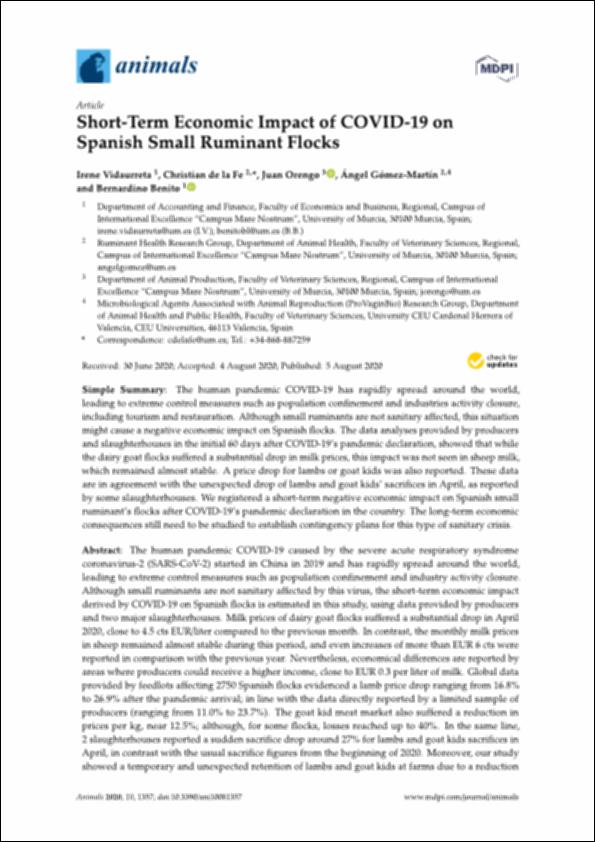Por favor, use este identificador para citar o enlazar este ítem:
http://hdl.handle.net/10637/12499Short-term economic impact of COVID-19 on Spanish small ruminant flocks
| Título : | Short-term economic impact of COVID-19 on Spanish small ruminant flocks |
| Autor : | Vidaurreta Porrero, Irene Fe Rodríguez, Christian de la Orengo Femenía, Juan Gómez Martín, Ángel Benito López, Bernardino |
| Materias: | Depressions - 2020 - Spain.; Rumiants.; COVID-19 (Disease) - Spain.; Crisis económicas - 2020 - España.; Agricultura - Aspectos económicos - España.; Agriculture - Economic aspects - Spain.; Precios - Control - España.; Price regulation - Spain.; COVID-19 - España.; Productos lácteos - Precios - España.; Meat - Prices - Spain.; Dairy products - Prices - Spain.; Productos cárnicos - Precios - España.; Rumiantes.; Spain - Economic conditions - 2020.; España - Situación económica - 2020. |
| Editorial : | MDPI |
| Citación : | Vidaurreta, I., de la Fe, C., Orengo, J., Gómez-Martín, Á. & Benito, B. (2020). Short-term economic impact of COVID-19 on Spanish small ruminant flocks. Animals, vol. 10, i. 8 (05 aug.), art. 1357. DOI: https://doi.org/10.3390/ani10081357 |
| Resumen : | The human pandemic COVID-19 caused by the severe acute respiratory syndrome coronavirus-2 (SARS-CoV-2) started in China in 2019 and has rapidly spread around the world, leading to extreme control measures such as population confinement and industry activity closure. Although small ruminants are not sanitary a ected by this virus, the short-term economic impact derived by COVID-19 on Spanish flocks is estimated in this study, using data provided by producers and two major slaughterhouses. Milk prices of dairy goat flocks su ered a substantial drop in April 2020, close to 4.5 cts EUR/liter compared to the previous month. In contrast, the monthly milk prices in sheep remained almost stable during this period, and even increases of more than EUR 6 cts were reported in comparison with the previous year. Nevertheless, economical di erences are reported by areas where producers could receive a higher income, close to EUR 0.3 per liter of milk. Global data provided by feedlots a ecting 2750 Spanish flocks evidenced a lamb price drop ranging from 16.8% to 26.9% after the pandemic arrival; in line with the data directly reported by a limited sample of producers (ranging from 11.0% to 23.7%). The goat kid meat market also su ered a reduction in prices per kg, near 12.5%; although, for some flocks, losses reached up to 40%. In the same line, 2 slaughterhouses reported a sudden sacrifice drop around 27% for lambs and goat kids sacrifices in April, in contrast with the usual sacrifice figures from the beginning of 2020. Moreover, our study showed a temporary and unexpected retention of lambs and goat kids at farms due to a reduction in animals slaughtered during this period. In conclusion, data evidenced a considerable negative economic impact on Spanish small ruminant flocks, throughout the first 60 days after COVID-19’s pandemic declaration. Further studies are needed to evaluate the long-term economic consequences, in order to establish contingency plans and avoid the collapse of small ruminant industries when a crisis of these characteristics occurs. |
| Descripción : | Este artículo se encuentra disponible en la siguiente URL: https://www.mdpi.com/2076-2615/10/8/1357 Este artículo pertenece a la sección "Small ruminants". |
| URI : | http://hdl.handle.net/10637/12499 |
| Derechos: | http://creativecommons.org/licenses/by/4.0/deed.es |
| ISSN : | 2076-2615 (Electrónico). |
| Fecha de publicación : | 5-ago-2020 |
| Centro : | Universidad Cardenal Herrera-CEU |
| Aparece en las colecciones: | Dpto. Producción y Sanidad Animal, Salud Pública Veterinaria y Ciencia y Tecnología de los Alimentos |
Los ítems de DSpace están protegidos por copyright, con todos los derechos reservados, a menos que se indique lo contrario.


